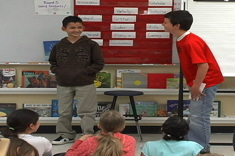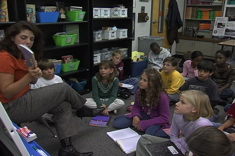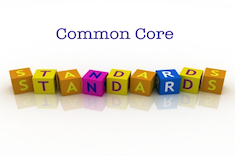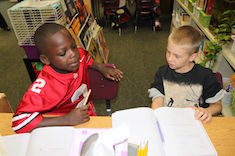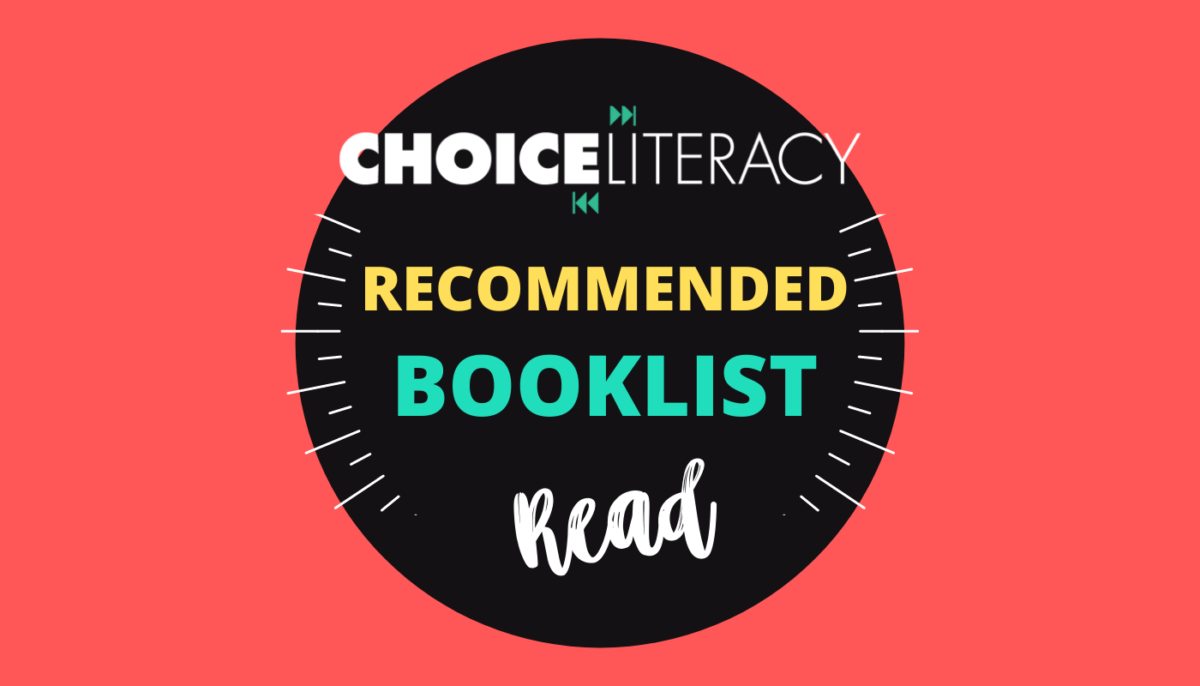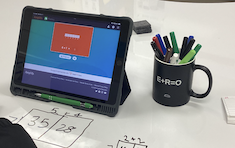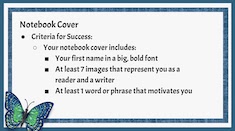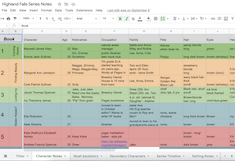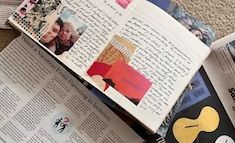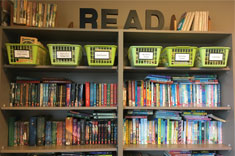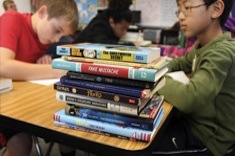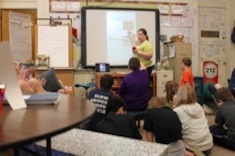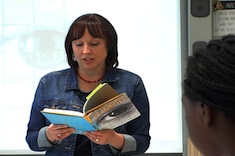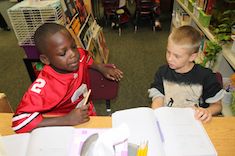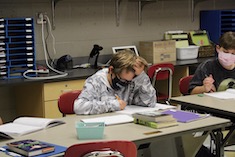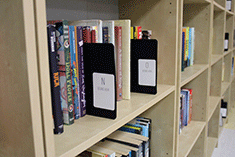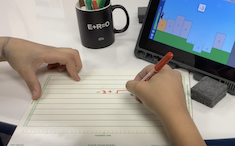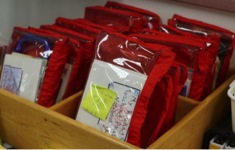6th
Latest Content
The “All About Us” Board: Linking Literacy and Community Building All Year Long
Suzy Kaback has terrific tips for an ever-evolving “All About Us” bulletin board to use from the first day of school to the last.
Comprehending Graphic Novels: A Primer for Teachers
Mary Lee Hahn provides a quick primer for teachers new to graphic novels, as well as suggestions for using these novels to teach comprehension.
Common Core Conversations: Increasing Argumentative Writing
Teachers continue to puzzle over and sort through the terminology in the Common Core related to opinion and persuasive writing. Amanda Adrian and Heather Rader consider terms and teaching strategies.
Breathing New Life into the Writer’s Notebook
Tara Smith finds her sixth graders have years of experience with writer's notebooks by the time they reach her classroom. How to inspire enthusiasm for a familiar tool? Mix old favorite tasks and lessons with fresh texts and tech-savvy options.
Choosing Books in Verse
Tara Barnett and Kate Mills offer tips and a booklist to position students to read novels in verse.
Ready-to-Go Book Talks
Leigh Anne Eck shares the dilemma of many teachers—at the start of a new school year, book talks are easy to keep up with because the fresh reads from the summer are front of mind. But as the year gets busy, it becomes more difficult to keep up, and it’s easy to let book talks fall away. Leigh Anne offers a simple and practical solution to have book talks ready no matter how busy or frazzled you are!
Teaching = Communication
Jodie Bailey reflects on the power and problem of using acronyms to define the order of operations for students. She offers several routines to foster an understanding of mathematical concepts beyond memorizing an acronym.
Setting Middle School Readers Up for Success
Tara Barnett and Kate Mills share ways to set up middle school readers for a successful independent reading life. Download two reading reflections to help students pause and consider where they are and where they want to go as readers.
Criteria for Success
Jen Vincent shares how to create a Criteria of Success to clearly define expectations for assignments and give students independence in self-assessment.
Using Fiction Writing to Change Attitudes About Writing
Katherine Sokolowski encourages teachers to take time for students to individualize the writing process and enjoy fiction writing by engaging in National Novel Writing Month. Download the story bible as a place for students to plan their stories.
Writing as an Act of Resistance and a Source of Strength
In this beautiful personal essay, Stella Villalba reminds us that writing is a source of strength, and developing a community of writers is essential in post-pandemic classrooms.
Launching a Classroom Library
Melissa Styger slows down the launch of the classroom library to ensure it is a valuable resource all year.
Field Experience: Supporting Independent Reading, Choice and Stamina
Helping students learn to choose books and develop stamina are important to developing independent readers. Ruth Ayres designed a field experience with opportunities to see minilessons, small group instruction, team meetings and a share session that support independence in readers.
Using 9/11 Research to Build Community and Writing Process
Katherine Sokolowski gives space for students to research and share their learning about 9/11 in order to build a community of writers, as well as nourish the research and writing process.
Middle-Grade Mental Health Booklist
Leigh Anne Eck shares an important booklist for middle-grade readers on mental health topics and with characters navigating mental health struggles.
Talking Through Characters
Melanie Meehan shares activities that help students talk about their characters before writing about them in a realistic fiction unit.
Overcoming: Helping Students Process Covid Feelings
Julie Cox reminds us that for many students, the loneliness and fear of COVID years clings like smoke, and they don’t always have the language to talk about it. While we have worked hard at helping students reclaim content knowledge, we must also help them express and process feelings they might not know how to recognize.
Giving Writers What They Need
Tara Barnett and Kate Mills are inspired by their own writing retreat experience to give students exactly what they need to thrive as writers. Take their advice to help writers thrive in your classroom, too.
Quick Take: Special Library Shelves
Christy Rush-Levine shares a few special shelves in her classroom library.
Magnifying the Moment
Jodie Bailey breaks down how to magnify a moment to highlight key understandings during classroom discourse. By focusing on the words embrace, engage, and empower, a variety of different ideas can be uplifted.
Using Skype in the Classroom
Katherine Sokolowski has suggestions for Skype use in classrooms, covering everything from student etiquette to special events.
Organizing Materials to Support Literacy Learning (Classroom Design Series Part 3)
Ann Marie Corgill shares how she organizes materials for literacy learning in the third installment of her design series.
Intentional Consolidation and Closure
Mallory Messenger emphasizes the importance of providing time for students to share their learning and offers different formats for a share session. Mallory guides us in making decisions so that share time consolidates and uplifts the learning.
Browse Content By
Type
Category
- Assessment Tools
- Big Fresh Archives
- Booklists
- Choice Numeracy
- Classroom Design
- Common Core
- Community Building
- Conferring
- Content Literacy
- Digital Literacy
- English Language Learners
- Equity
- Family Relations
- Free Samples
- Guiding Groups
- Leadership
- Literacy Coaches
- Mentor Texts
- Minilessons
- New Teacher Mentors
- Podcasts
- Poetry
- Quote Collections
- Reading Strategies
- Self Care
- Struggling and Striving Learners
- Talking and Listening
- Teacher Study Groups
- Teaching Reading
- Teaching Writing
- Word Study and Vocabulary
Author
- Melissa Quimby
- Nawal Qarooni
- Gwen Blumberg
- Julie Cox
- The Lead Learners
- Hannah Tills
- Josie Stewart
- Ruth Metcalfe
- Mallory Messenger
- Becca Burk
- Jodie Bailey
- Vivian Chen
- Mary Brower
- Tiffany Abbott Fuller
- Stephanie Affinito
- Ruth Ayres
- Leigh Anne Eck
- Heather Fisher
- Shari Frost
- Julie Johnson
- Suzy Kaback
- Gigi McAllister
- Shirl McPhillips
- Melanie Meehan
- Cathy Mere
- Debbie Miller
- Tara Barnett and Kate Mills
- Tammy Mulligan
- Dana Murphy
- Bitsy Parks
- David Pittman
- Brenda Power
- Heather Rader
- Matt Renwick
- Mandy Robek
- Christy Rush-Levine
- Gretchen Schroeder
- Jen Schwanke
- Brian Sepe
- Katherine Sokolowski
- Stella Villalba
- Jennifer Vincent
Grade Level
Choice Literacy Membership
Articles
Get full access to all Choice Literacy article content
Videos
Get full access to all Choice Literacy video content
Courses
Access Choice Literacy course curriculum and training

